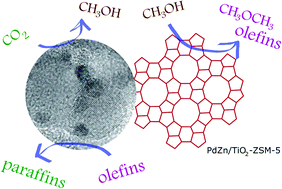Identification of C2–C5 products from CO2 hydrogenation over PdZn/TiO2–ZSM-5 hybrid catalysts†
Abstract
The combination of a methanol synthesis catalyst and a solid acid catalyst opens the possibility to obtain olefins or paraffins directly from CO2 and H2 in one step. In this work several PdZn/TiO2–ZSM-5 hybrid catalysts were employed under CO2 hydrogenation conditions (240–360 °C, 20 bar, CO2/N2/H2 = 1 : 1 : 3) for the synthesis of CH3OH, consecutive dehydration to dimethyl ether and further oxygenate conversion to hydrocarbons. No significant changes after 36 h reaction on the methanol synthesis catalyst (PdZn/TiO2) were observed by XRD, XAS or XPS. No olefins were observed, indicating that light olefins undergo further hydrogenation under the reaction conditions, yielding the corresponding alkanes. Increasing the aluminium sites in the zeolites (Si : Al ratio 80 : 1, 50 : 1 and 23 : 1) led to a higher concentration of mild Brønsted acid sites, promoting hydrocarbon chain growth.

- This article is part of the themed collection: Carbon dioxide utilisation


 Please wait while we load your content...
Please wait while we load your content...